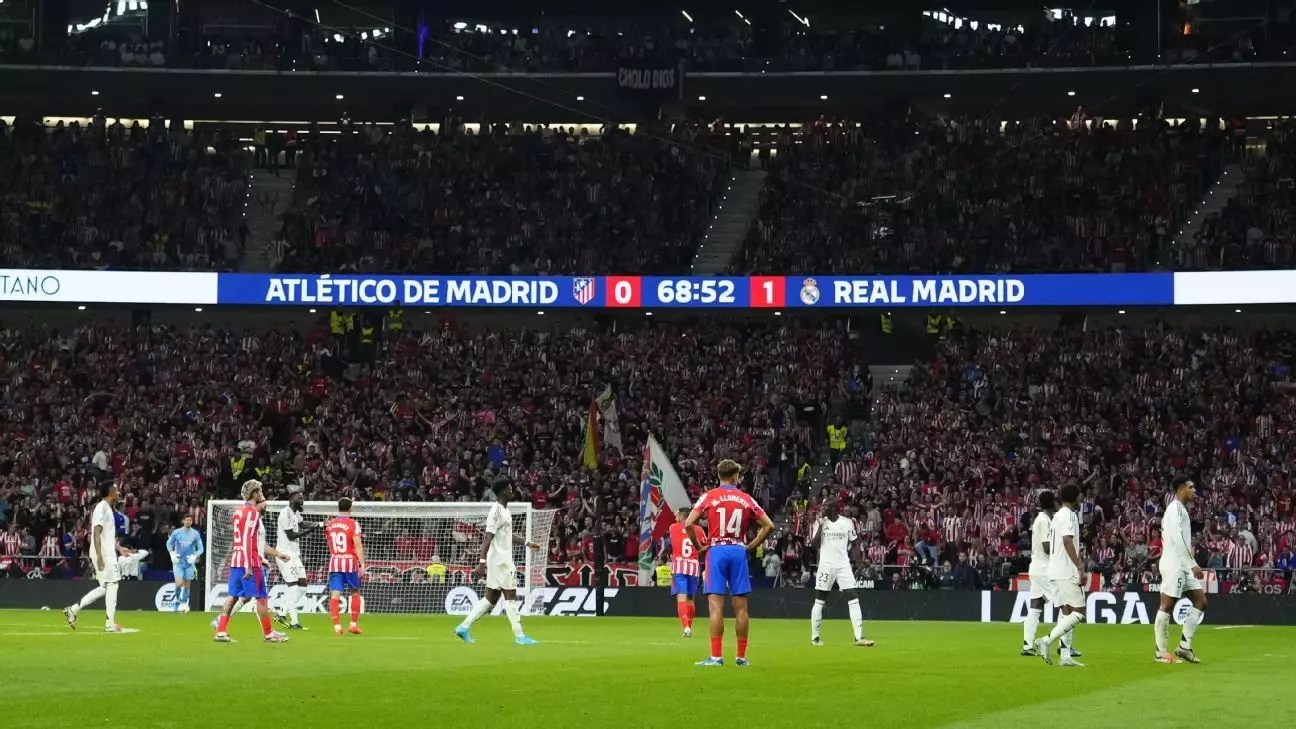The highly anticipated derby between Atlético Madrid and Real Madrid on Sunday night took a shocking turn, leaving fans, players, and authorities grappling with the implications of crowd behavior in modern football. At the 68:30 mark, when Real Madrid’s Éder Militão scored to give his team a 1-0 lead, a passionate atmosphere quickly deteriorated. What should have been a celebration turned into chaos as objects were hurled onto the pitch, prompting officials to suspend the match. Such incidents raise pressing questions not only about crowd control and safety but also about the responsibilities of players in influencing their supporters’ behavior.
When Militão’s goal was scored, joy surged through the Real Madrid supporters, contrasting sharply with the angry reactions from Atlético fans. It became apparent that the rivalry exceeded the confines of a mere sporting event. The intense emotions associated with these matches often lead to fervent expressions of loyalty and frustration, sometimes spilling over into negative actions. The reaction of Atlético fans towards Thibaut Courtois, a former player, highlighted how quickly passion can morph into hostility. Thrown objects, including lighters and bottles, served as tangible evidence of this tension.
Courtois himself played a key role in these events. Celebrating with fervor, he ignited further antagonism from the Atlético crowd, which resulted in him needing to alert the referee on the increasing hostility from fans. His situation underscores the complex interaction between players and spectators in high-stakes matches. While players deserve the freedom to celebrate their achievements, they must also recognize the potential ramifications of their reactions and how they can stoke the already heated atmosphere present during a derby.
Officials and Their Decision-Making
The response by referee Mateo Busquets Ferrer to pause the game was imperative. His priority was ensuring player safety amidst escalating hostility. After issuing multiple warnings and observing the adverse environment, his choice to send the teams into the dressing rooms for an indefinite timeout reflects a decisive step towards restoring order. Notably, both coaches involved acknowledged the appropriateness of his actions. Carlo Ancelotti, the Real Madrid coach, emphasized that stopping the game was not a decision made lightly but was warranted given the circumstances.
Moreover, the presence of police and the broadcasting of multiple warnings indicated a structured approach to tackling fan misbehavior. However, the effectiveness of these measures remains in question, especially when viewed through the aftermath of the brief suspension and the response of the fans once the match resumed. Maintaining decorum among supporters in such an emotionally charged setting poses an ongoing challenge.
Controversially, both Atlético coach Diego Simeone and player Koke pointed fingers at Courtois, suggesting that his goal celebration provoked fans. While it is crucial for players to exhibit restraint in their celebrations, blaming them for extreme fan behavior shifts focus away from the real issue—the actions of a handful of irresponsible fans who jeopardized the safety of players and the integrity of the match.
The dynamic between players and fans is intricate. Players are indeed role models, and their celebrations can influence supporters, but they are not responsible for the actions of individuals fueled by passion and hostility. Koke’s insistence that players should act intelligently, minimizing provocations, speaks to a broader expectation for discipline in the heat of competition. Nonetheless, it is worth considering that the onus of responsibility should not fall equally on players, particularly when we recognize that misbehavior from a small minority can overshadow the actions of the majority.
As the derby concluded, Atlético Madrid issued a stern statement condemning the behavior of fans and promising cooperation with authorities in identifying culprits. This effort signals an awareness of the serious implications surrounding crowd control. Moving forward, it is essential that clubs take robust measures to ensure the safety of all involved, from players to other supporters. Addressing incidents of violence and unruly behavior cannot solely rely on match officials or law enforcement; it demands a commitment from clubs and the fanbase itself.
As Atlético’s players made their rounds to thank fans, a clear divide emerged in the stadium, with whistles directed at the offending supporters. This moment speaks volumes about the pervasive social contract within football culture—it is a sport loved passionately, yet the ramifications of our actions must be acknowledged and acted upon.
The incident at the Metropolitano should serve as a stark reminder of the volatility present in high-stakes matches. The blend of passion, rivalry, and heightened emotions, while animating the spirit of football, can also lead to severe consequences. The responsibility lies with all stakeholders—players, officials, clubs, and fans—to foster a culture of respect that honors the game.


Leave a Reply